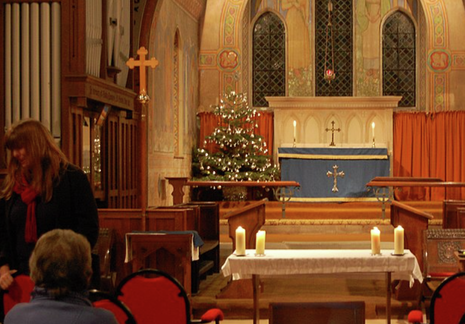Bring back that silent night
As more and more student churches become focused on flashy performances, Esther Arthurson argues that some of the beautiful simplicity of faith has been lost

When someone invites me to a carol service, I anticipate some hearty communal singing, excerpts from the biblical Christmas story, and – if they’re really pulling out the big guns – perhaps a candle or two. Needless to say I did not expect my local church to put on a production worthy of Wembley Stadium, kitted out with a small forest of Christmas trees and a smoke machine. And yet, they did. In fact, the only thing missing was a small troop of seraphim descending on ziplines to supply the descant of ‘O Come All Ye Faithful’. (Not that the angels would have recognised their cue, since the song was warped beyond recognition in an effort to modernise it or, as some might say, unce-unce-uncify it.)
Deforestation issues aside, the slick delivery and performative aspect of this perhaps misnamed carol service also left me feeling uncomfortable – a sentiment I have since been assured was not uncommon among my fellow attendants. This was retrospectively evident when half the audience departed on hearing a pre-planned call for an encore that perhaps belonged more to a school production of Les Mis than a church service.
“In these high-production church events, I would argue that something essential is lost amidst the lights and the amps”
Something innate within this entire experience felt off. The congregation, a word loaded with the communal significance and connotations of participation, was relegated to the role of audience, a passive body distanced from those on the stage and screens by both a literal and figurative chasm. Since when was the purpose of the church to perform or entertain? Christmas, a season when more people place tentative feet over the threshold of the church than any other, is surely instead a time to strip back the noise and the distractions and focus on the simple, beautiful message at the heart of it all, the singular candle (rather than thousands of noise-sensitive LEDs) in the darkness which requires the darkness to be most clearly seen.
There appears to have been a recent shift towards this more performance orientated direction among British evangelical churches, as we trudge further west in the charismatic footsteps of American mega-churches. ‘Is there anything wrong with such a trend?’ one might ask. Nothing on the surface – but dig deeper (or sit back and watch half a church’s population go all Exodus before the ‘final’ song), and it seems that churches veering in this direction are in danger of losing certain crucial values that have previously been dear to Christianity.
As a side-note, we must also be wary that the mediation of ministers and priests (dating back to the Levites of the Hebrew Bible) does not instead become the veneration of these individuals – and the common place of a stage in a church setting, if taken for granted, can expedite this process into one resembling reification, transforming religious leaders into something not far removed from TV personalities or minor, localised celebrities, and aiding the ever-growing divide between clergy and congregation in certain churches.
“Jesus is the ‘Prince of Peace,’ not the King of Smoke Machines”
Emphasis on presentation and production can detract from attention to authenticity and integrity which have previously been central religious values; indeed, these two sets of factors could even be regarded as oxymoronic. When a church’s limited budget is blown on a smoke machine, you have to stop and ask yourself what this is achieving and where else the funds could and should be going instead.
In these high-production church events, I would argue that something essential is lost amidst the lights and the amps. Something of the intimacy, community, involvement and even the centrality of Jesus and his message of hope, love and redemption are sacrificed amidst the spotlights and high-end speakers when church becomes a spectacle akin to a Broadway show.
An argument could perhaps be made that this change in approach is a long term result of Covid and the difficulties that online churches encountered in the constant struggle to grab and hold viewers’ attention from a screen. The current situation may be the residue of such habits; however, on the other side of the pandemic, when the world is busy, brimming and overwhelming once again, we are more in need of peace than ever before.
It is this peace, this stillness, that some churches are ultimately jeopardising. The world needs stillness and silence right now, not more noise and smoke and mirrors. Jesus is the ‘Prince of Peace,’ not the King of Smoke Machines. Churches seem to be losing sight of that and ignoring our dire need for a silent night in favour of a bigger, better and bolder advert for Christianity. But sometimes the simple things are powerful enough to speak for themselves. This notion is clearly situated in the Bible – Psalm 46:10 instructs, “Be still, and know that I am God,” and when the prophet Elijah is waiting on God, he does not find Him in the hurricane, the earthquake or the fire, but in “a still, small voice.”” Is it possible that our supersonic sound systems are drowning out the very divine whisper that they claim to be seeking? I fear that it is.
 News / Cambridge students set up encampment calling for Israel divestment6 May 2024
News / Cambridge students set up encampment calling for Israel divestment6 May 2024 News / Cambridge postgrad re-elected as City councillor4 May 2024
News / Cambridge postgrad re-elected as City councillor4 May 2024 News / Proposed changes to Cambridge exam resits remain stricter than most7 May 2024
News / Proposed changes to Cambridge exam resits remain stricter than most7 May 2024 News / Some supervisors’ effective pay rate £3 below living wage, new report finds5 May 2024
News / Some supervisors’ effective pay rate £3 below living wage, new report finds5 May 2024 Fashion / Class and closeted identities: how do fits fit into our cultures?6 May 2024
Fashion / Class and closeted identities: how do fits fit into our cultures?6 May 2024






